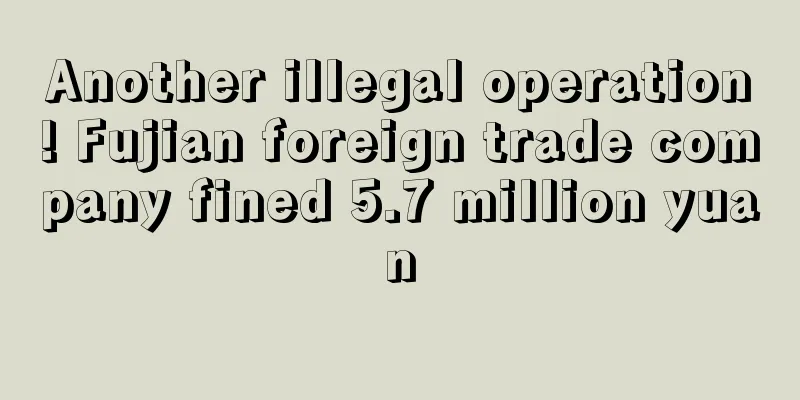The seller worked hard for more than a year, lost nearly 3 million yuan, and had to pay more than 20 million yuan...

|
Recently, the editor saw an interesting statement: Everyone is destined to die, either from Amazon, or from Wish... a fine!
Basically, every platform will be criticized by sellers, and this is particularly true on the Wish platform . It is understood that fines are as normal as daily meals for Wish sellers , so much so that if they open the backend and don’t see the fine news one day, they will mutter in dissatisfaction: Wish is so kind, there must be punishment behind it.
The editor learned that among many examples of fines, a Wish seller was fined US$3,441,674 by the platform, which is equivalent to more than 20 million yuan. In anger, the seller took Shanghai Weishi Network Technology Co., Ltd. (an organic part of the Wish cross-border e-commerce platform and responsible for the localization work of the Wish e-commerce platform in mainland China) to court.
As a result, I lost the case ...
Is the reason behind the failure of the bargaining between sellers and platforms because the platform exploited legal loopholes, or is it that the sellers deserved the punishment?
After working on Wish for more than a year, sellers were fined more than 20 million
It is understood that on February 9, 2017, the plaintiff Liu Moumou applied for registration on the Wish cross-border e-commerce platform after being recommended by advertising and became a business operator on the platform.
After registration, Liu sold electronic digital products on the platform, all of which were sold to consumers outside mainland China. The logistics and transportation of the goods were undertaken by Wishpost, a logistics sub-platform under the Wish e-commerce platform. According to the platform service agreement, the e-commerce platform and the logistics sub-platform extracted commissions or charged freight in proportion to Liu's sales activities.
On December 13, 2018, the Wish e-commerce platform closed down Liu's store on the grounds of "detecting inappropriate content in the products" and fined Liu USD 3,441,674.82. At the same time, the remaining balance of USD 421,627.09 in Liu's platform account at that time was withheld.
Liu requested that Weishi Company be ordered to return his payment of RMB 2,824,901 ( all currencies below are RMB) and pay the interest during the period of capital occupation (based on RMB 2,824,901 , calculated in accordance with the loan market quotation rate announced by the National Interbank Funding Center from December 14 , 2018 to May 13, 2020 ) .
To summarize the above content, we can see that this Wish seller joined the platform on February 9, 2017. After working hard for more than a year, he was successfully fined US$3,441,674.82. At the same time, the US$421,627.09 (nearly RMB 3 million) in his account that had not been withdrawn was also withheld and could not be recovered.
The court ruled that the seller lost the case. Was this an expected result?
The focus of the dispute in this case is summarized as follows: whether the actual operator and manager of the Wish cross-border e-commerce platform is Weishi Company, and whether the punishment of Liu Jianwen on the platform was carried out by Weishi Company.
Regarding the focus of the dispute, Liu believed that Weishi Company was the operator and manager of the Wish e-commerce platform, and had actually implemented the seizure and deduction of funds against him; Weishi Company believed that the owner, manager and operator of the platform were all its parent company, ContextLogic Company. As a subsidiary established in mainland China, it must provide assistance for communication between the parent company and Chinese merchants and some localization work on the Wish platform (such as translation service agreements and related policies, etc.) in accordance with the instructions of the parent company. It had neither the authority nor the possibility to seize or deduct funds from Liu Jianwen.
After a fierce debate, the court finally ruled that Liu lost the case. Liu was dissatisfied with the result and appealed, but his appeal was rejected. He also had to pay the second-instance case acceptance fee of 29,409 yuan. In this case, the judge also made some suggestions to Shanghai Weishi. The judge stated: Although Weishi Company is not the direct responsible party, as an organic part of the Wish cross-border e-commerce platform, it has the responsibility to receive and convey various opinions from mainland Chinese users and to provide timely feedback to the parent company to help the parent company properly handle complaints from mainland Chinese merchants.
However, once you are fined by Wish, it is extremely difficult to get your money back. There are countless examples of Wish sellers being fined, and there are also many sellers who want to get back the fines and withheld money. Unfortunately, many sellers have ended up with nothing like Liu.
A seller once said that he wanted to protect his rights after being fined hundreds of thousands of yuan by the Wish platform, but the answer he got after consulting was that Wish’s server was located abroad, so it had no control over it at all.
Sellers keep complaining, why does Wish receive so much criticism?
" Wish is taking advantage of loopholes to reap the Chinese people's money! How despicable. " The editor found that basically every comment on every article related to Wish was filled with curses.
A: There is no accumulation of experience on this platform at all. Several years of hard work are gone just like that!
B: It’s a rubbish platform. Products that are sold for a few dollars in the seller’s backend are marked up by more than ten dollars in the frontend, but the seller’s own store does not mark up the price. Is this fair competition?
C: I lost tens of thousands of dollars in two months, and I was accused of misleading others because I wrote a wrong size. I was fined and my funds were permanently frozen. I provided a lot of evidence in the appeal, but there has been no news for four months.
D: The so-called A+ logistics developed by Wish is nominally designed to solve the pain points of logistics for sellers, but in reality it is intended to reap the huge profits from cross-border logistics.
From the sellers' complaints, it can be seen that abnormal fines, self-operated follow-up sales, manipulation of currencies to earn differences, and the presence of a large number of standard clauses in signed contracts are widely criticized.
The number of Wish Chinese sellers has been decreasing
It is such a controversial platform that finally went public successfully. After the listing, we were able to get a glimpse of the true revenue situation of the Wish platform.
Data shows that Wish's revenue in 2017, 2018 and 2019 was US$1.101 billion, US$1.728 billion and US$1.901 billion respectively .
Wish also stated in its prospectus that it had a net loss of US$207 million in 2017, and an adjusted EBIT of US$135 million; a net loss of US$208 million in 2018, and an adjusted EBIT of US$211 million; a net loss of US$129 million in 2019, and an adjusted EBIT of US$127 million. As of September 30, 2020, Wish's net loss was US$176 million, and its adjusted EBIT was US$99 million.
According to the latest data released by Wish , its total revenue only increased by 34% year-on-year in 2020. However , its logistics revenue was extremely strong . Wish's logistics revenue in 2020 increased by 275% compared with its logistics revenue in 2019.
"Since you all say that the Wish platform is rubbish, why are people still doing it? Why did Wish succeed in its IPO?" This is the question many people outside the industry have.
Harvesting the market at low prices should be one of the main reasons why it can survive and occupy a large market share.
According to a new report from Apptopia, Amazon, Walmart, and Wish are the three most downloaded mobile shopping apps in the United States in 2020. Amazon has 41 million downloads, Walmart has 34 million, and Wish has 30 million.
All I can say is that Wish's data is very impressive. Although Wish has a large number of consumers, the platform's various harsh systems, since sellers cannot resist, quitting is their last weapon.
As we all know, the Wish platform is basically full of Chinese merchants. Since the outbreak of the epidemic, the number of Chinese sellers on the Wish platform has dropped sharply.
Wish previously stated in its prospectus that in January and February 2020, businesses across China were affected by the first outbreak of the COVID-19 virus before it spread globally, and many businesses were closed due to nationwide lockdowns. This affected many of our merchants in China, who experienced severe manufacturing and supply disruptions in the first quarter. Today, China represents the majority of our merchants, and as a result, we have seen a decrease in the number of merchants selling on our platform and the number of products available for sale.
"I will never do Wish again, never!" said many former Wish sellers. |
>>: TikTok ranked first in Q1 downloads! It continues to grow rapidly
Recommend
Amazon seller successfully defends rights after malicious infringement complaint
According to an Amazon seller, one of his product...
AliExpress assists in promoting Brazil's compliance program and helps merchants obtain small tax exemption policies
According to Brazilian media reports, at the requ...
Walmart offers free warehousing to compete with Amazon
For cross-border sellers, warehousing is a very i...
What is Sellware? Sellware Review, Features
Sellware can help you process orders more easily. ...
What is zellart? zellart Review, Features
zellart large canvas prints for home and office de...
US retail sales have grown for four consecutive months, and the market potential remains huge
U.S. retail sales rose 0.3% in November, the four...
What is Rad Power Bikes? Rad Power Bikes Review, Features
Rad Power Bikes is a shop dedicated to building th...
Another Amazon warehouse is going on strike!
According to foreign media reports, following the...
Facebook officially changes its name to Meta, moving towards the metaverse!
This Thursday, US time, Facebook officially annou...
The epidemic has given rise to a new era of "aprons", and the sales of kitchen supplies on Colombian e-commerce platforms have soared!
According to statistics from e-commerce service c...
UPS and union talks break down! Strike closer
As the expiration date of the contract between UP...
Amazon opens first offline clothing store
The company announced on January 20 that its firs...
Teikametrics Releases Amazon Advertising Benchmark Data for Q4 2021
Teikametrics today announced the release of “ New...
What is ID Sarrieri? ID Sarrieri Review, Features
ID Sarrieri is a website focusing on lingerie and...
What is PledgeMusic? PledgeMusic Review, Features
PledgeMusic was launched in 2009 and is the most ...









